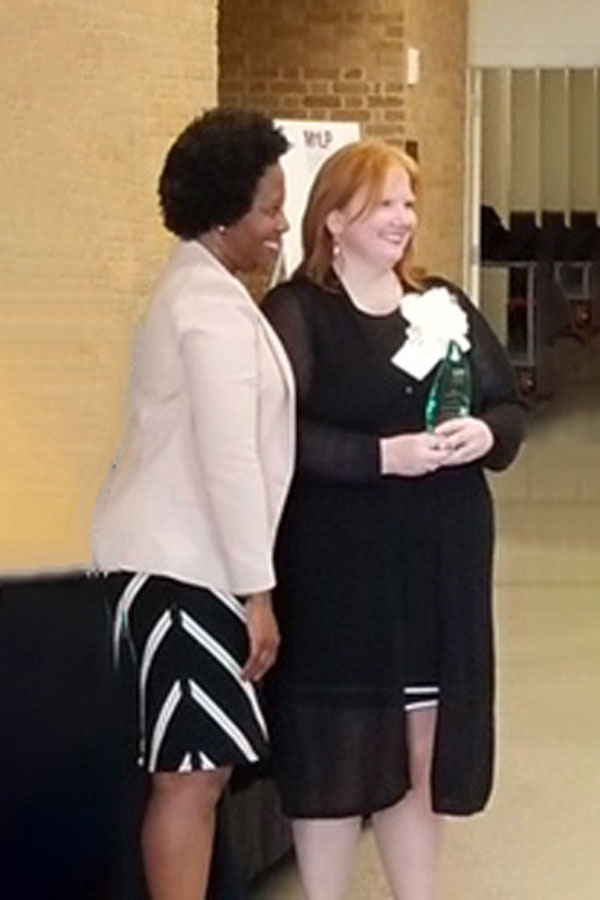


Article by Featured Author
Posted September 2019Many people go to law school with aspirations of becoming an Atticus Finch. I remember speaking with a contemporary attorney when we were both relatively new to the practice of law. His comment was something like “of course, everyone goes to law school because they want to help people.” I was not at all part of his “everyone.” I am not an uncaring cold person at all. But, I studied business in college and graduate school and my purpose of going to law school was to continue in the business world. Helping others is great, but for me, helping others with legal issues for free was not in the cards.
Imagine my surprise when I opened a letter from MVLP’s Gayla Carpenter-Stevens announcing that I was “selected to receive the 2019 Pro Bono Award.” How in the world did this happen? While I spent time over the years listening to what types of cases MVLP had open and desperately needed attorneys to handle, I would get a queasy feeling when thinking about representing someone in a divorce case. And how am I going to get in my minimum billable hours plus more to get a bonus if I’m giving up time to represent someone pro se? Sorry, no thanks, not for me. I wish I had taken the time to explore the many different ways to provide pro bono services earlier in my career.
When I started my own firm a couple of years ago, I decided that it was time to dedicate some of my time to helping others with legal issues. Really, my lawyer friends decided this for me by referring their relatives and neighbors who needed help but their law firms had conflicts. One woman, in particular, was being sued by a big bank/credit card company. My friend’s law firm represented said bank. This lady literally had no money other than her modest at best social security check but needed an attorney to help her sort out the mess. Sure, I’ll help her out (but don’t forget to call me when you need a mediator, contract researcher, or help with an appeal — and spread the word while you’re at it!). Now, I’m still not chomping at the bit to take on a divorce case, but I will help mediate a divorce with clients who otherwise could not afford that alternative. I’ve also discovered that I enjoy participating in the various clinics MVLP and other organizations host throughout the year. While the clinics have not been topics in my typical fields of practice, there are experienced lawyers (and sometimes judges) available to discuss the cases and sort out issues.

Robb accepting the MVLP Pro Bono Award
The clinics provide a way for volunteer lawyers to help people basically on the spot with important things that make an impact in their ability to get ahead and strive. For example, there are lots of children living with grandparents or other relatives — they need a guardianship to enroll in school. Guardianship clinics get kids to school. Expungement clinics help people who have a criminal history but are eligible to have it removed from their record. Once this is done, they can get work. These are win/win scenarios as the individual involved benefits as does the community. Clinics are a great option for attorneys who cannot commit to giving more than a few hours at a time to provide pro bono services. Busy lawyers or associates concerning with billable hours can incorporate a clinic day or two into their practice. I wish I had understood this when I was a younger lawyer. Look for a statewide expungement clinic set for March 21, 2020 presented by the Magnolia Bar and Mississippi Women Lawyers Association are headlining.
There are other opportunities beyond volunteer legal clinics and domestic work — examples are MVLP’s Mississippi Settlement Assistance Program and the Fifth Circuit’s Pro Bono Program for pro se civil appellants. Attorneys who volunteer with Mission First Legal Aid Office assist with issues such as non-divorce family law, consumer law, government benefits, housing, and debtor/creditor disputes. Look for other opportunities in unfortunate widespread events such as weather disasters or high impact situations such as the recent ICE Raids.
While we as Mississippi Lawyers do not have to provide pro bono services, it is certainly encouraged:
Each member of the Mississippi Bar in good standing and not exempt hereunder, as part of the member’s professional responsibility, should (1) render pro bono legal services to the poor and (2) participate, to the extent 102 possible, in other pro bono service activities that directly relate to the legal needs of the poor.
If you have already completed your bar renewal for this year, were you able to check the box stating you’ve provided pro bono services? I’ve checked the no but I’ll send in a check box before — so I’ve been there and am not judging. But not this year! Consider committing to providing services during this bar year. Think outside of the box and look for ways to pitch in — there will be an opportunity that fits your comfort level and abilities. As Justice O’Connor stated, we owe it to our profession:
Certainly, life as a lawyer is a bit more complex today than it was a century ago. The ever increasing pressures of the legal marketplace, the need to bill hours, to market to clients, and to attend to the bottom line, have made fulfilling the responsibilities of community service quite difficult. But public service marks the difference between a business and a profession. While a business can afford to focus solely on profits, a profession cannot. It must devote itself first to the community it is responsible to serve. I can imagine no greater duty than fulfilling this obligation. And I can imagine no greater pleasure.